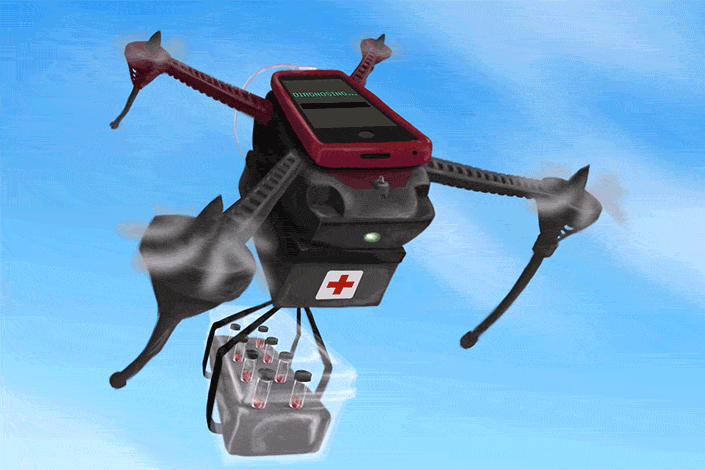Lab-on-a-drone could improve management of disease outbreaks

Image: Research Communications and Public Relations
A new technology that combines a small diagnostic lab with an unmanned quadcopter can help emergency managers to monitor and better control outbreaks of infectious diseases in remote areas, a Texas A&M University researcher says.
The robust, low-cost and portable technology is the work of Victor Ugaz, a professor and holder of the Charles D. Holland ’53 Professorship and the Thaman Professorship, as well as the associate department head in the Artie McFerrin Department of Chemical Engineering.
By eliminating the need for samples collected in the field to be transported to distant laboratories for analysis by specialized personnel, the lab-on-a-drone technology can also accelerate diagnosis, enable pinpoint delivery of therapeutics, and help provide real-time data to better inform decision making.
The technology not only transports medical test kits and samples to and from areas with little or no no access to a lab infrastructure, it also can perform the diagnostic tests during flight, Ugaz says.
The ability to perform rapid in-flight assays with smartphone connectivity eliminates delays between sample collection and analysis so that test results can be delivered in minutes, suggesting new possibilities for drone-based systems to function in broader and more sophisticated roles beyond cargo transport and imaging, Ugaz said.
A detailed overview of the technology was recently published in Analytical Chemistry, a scientific journal of the American Chemical Society.
Co-authors of the report include doctoral student Ashish Priye and a team of undergraduate students involved in Texas A&M’s AggiE-Challenge program, who worked together to develop the initial PCR device prototype.
“The students’ efforts helped to take our fundamental knowledge from the lab and show how it could be implemented as a product,” said Ugaz.
The researchers also collaborated with College Station-based technology start-up, AI Biosciences, Inc., to adapt diagnostic assays to their platform and to show how the drone can be transformed into a mini centrifuge so that sophisticated pop-up laboratories can be established in any field site.

